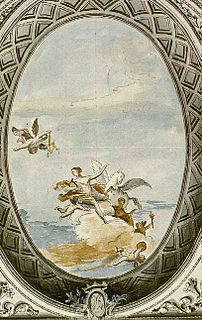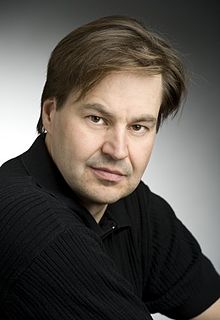| Look up Don Giovanni in Wiktionary, the free dictionary. |
Don Giovanni is a 1787 opera with music by Wolfgang Amadeus Mozart.

Don Giovanni is an opera in two acts with music by Wolfgang Amadeus Mozart and Italian libretto by Lorenzo Da Ponte. It is based on the legends of Don Juan, a fictional libertine and seducer. It was premiered by the Prague Italian opera at the National Theater, now called the Estates Theatre, on 29 October 1787. Da Ponte's libretto was billed as a dramma giocoso, a common designation of its time that denotes a mixing of serious and comic action. Mozart entered the work into his catalogue as an opera buffa. Although sometimes classified as comic, it blends comedy, melodrama and supernatural elements.
Don Giovanni may also refer to:
- Don Juan, a legendary, fictional libertine, basis of the opera
- Don Giovanni Tenorio , a 1787 opera by Giuseppe Gazzaniga
- Don Giovanni (album), a 1986 album by Lucio Battisti
- Don Giovanni (1970 film), an Italian comedy-drama film
- Don Giovanni (1979 film), a French-Italian film
- Don Giovanni Records, an independent record label

Don Juan, also Don Giovanni (Italian), is a legendary, fictional libertine. Famous versions of the story include a 17th-century play, El burlador de Sevilla y convidado de piedra by Tirso de Molina, and an 18th-century opera, Don Giovanni, with music by Mozart and a libretto by Lorenzo da Ponte.

Don Giovanni, o sia Il convitato di pietra, also known as Don Giovanni Tenorio is a one-act opera by the Italian composer Giuseppe Gazzaniga. The opera was first performed at the Teatro San Moisè, Venice, on 5 February 1787, the same day as Francesco Gardi's opera Don Giovanni in the same city at the Teatro San Samuele The libretto, by Giovanni Bertati, is based on the legend of Don Juan as told by Tirso de Molina in his play The Trickster of Seville and the Stone Guest (c. 1630), leading to comparisons with Mozart's Don Giovanni which had its premiere later in 1787. Mozart's librettist, Lorenzo Da Ponte, certainly knew the earlier opera. Gazzaniga's work is much shorter than Mozart's, and originally formed part of a double-bill with another piece, Il capriccio drammatico.

Don Giovanni is an album by the Italian singer-songwriter Lucio Battisti. Nearly four years in its making, it was released in March 1986 by the Numero Uno label and was later re-released by Sony BMG. In stylistic terms, it features an avant-garde blend of an almost minimalist sound, featuring synthpop inspired electronics, with classic Italian popular music. The title of the album alludes to Mozart's famous work Don Giovanni.
| This disambiguation page lists articles associated with the title Don Giovanni. If an internal link led you here, you may wish to change the link to point directly to the intended article. |









